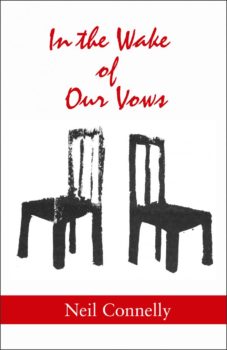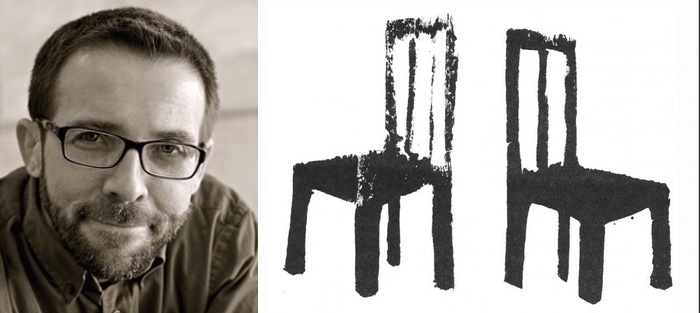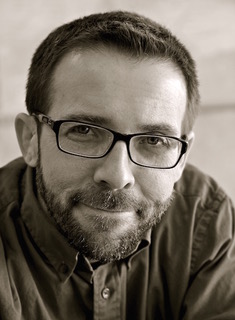Neil Connelly was the first and only man to shave my head. In 1997 I had just moved down to Lake Charles, Louisiana to start up in Robert Olen Butler’s MFA program at McNeese State, and the recently graduated Neil was teaching there as he explored his future options. I went to a barber shop and told the woman with the scissors that I had a natural part on the left; she proceeded to cut my hair as if it parted on the right, and no amount of gel could return it into anything resembling manageability. I sought solace in Neil because he was a working class, east-coast guy like me, and I looked to him for clues on how to survive living in Lake Charles. (At the time, this town had 75,000 people and two places to get espresso; one of them closed immediately after I arrived.)
“Steve,” he said, “it’s time.” He didn’t need to reference his own closely-shorn head for me to get the message, but in my memory I always add the gesture for effect. He shaved off the offending hair with his electric clippers, and I’ve kept the look ever since.
Neil has too, as you can see from his photo, and he’s also put out a varied body of work in fiction. He published two novels with Arthur Levine Books, a young adult imprint of Scholastic—St. Michael’s Scales (2002) and The Miracle Stealer (2010)—with Buddy Cooper Finds a Way from Simon & Schuster (2005) sandwiched between them. In 2013 LSU Press published The Midlife Crisis of Commander Invincible (you can find my interview with him about that here) and in 2014 Gorsky Press published The Pocket Guide to Divorce: A Self-Help Work of Fiction, which won their Molly Ivors prize.
Connelly has also been a dedicated teacher, and spent the first decade of this millennium back at McNeese State, where he eventually directed the creative writing program. He now teaches at Shippensburg University in Pennsylvania and has a fresh book out in February: the short story collection In the Wake of Our Vows from Fomite Press, which we talked about via email in the frenzied first ten days of the Trump presidency.
Interview:
Steven Wingate: A lot of the men who populate In the Wake of Our Vows are displaced or about to be displaced (like the young soon-to-be-father in “Pretend This is Your Baby”), or they get stuck and don’t leave their situations when they have the chance (like the protagonist of “Excerpts from a Billboard Diary”). Yet you’re the opposite of that: stable, dependable, and pretty far from rash. How do these not-like-you characters get into your imagination, and what are the nuances of writing them?
Neil Connelly: It’s great that you think I’m stable and rational.
Writers have only two sources when it comes to material—experience and imagination, yes? And of course, the imagination is fueled by experience. On some level, I think many if not most of my characters are fractured versions of me, alternate-universe Neils who at some point made a different choice than I did, or who were put in different circumstances. But they still feel essentially close to me, at the core. My characters scare me sometimes because I can’t tell if they provide a distorted mirror of their creator or an unobstructed view of his soul. Maybe it’s both. They definitely help me form my own self-perception. (Isn’t this also what happens when we read? Don’t we constantly compare or contrast our actions and attitudes with those of the fictional people we encounter?)
As for nuance, I tell my students to focus on developing aspects of their characters that they don’t share. The similarities will emerge on their own; that’s inevitable. Someone’s strong views on family, on faith, on the fundamentals issues—it takes tremendous effort to mask such things. So yeah, I’m in the camp that suspects art reveals the artist.
Others have commented on the contrast between me and my characters. Almost 20 years ago, my wife (then just friend) recognized my writing was fueled by some recently-generated pain and anger, and she asked me something like “Do you think if you worked this stuff out and had a happier life, you could still write well?”
“Absolutely,” I told her. “Cause then I’d always be afraid of losing that good life.”
You’ve mentioned that a few of the stories in this collection were first drafted over a decade ago. Did you go back into them, or simply let them be?
 I had to actively resist the urge to revise older work with my new perspective. The collection, for the most part, is set up in loose chronological order, with the older stories toward the front and the newer material toward the back. I felt an obligation to the “Neil-that-was” and didn’t want to try to improve some of those passages that, with distant hindsight and a hopefully more mature set of narrative tools at my disposal, I think I would handle differently now. But I’m convinced that because of time’s passage, I’d have mucked it up badly, diminished any soul those pieces do possess.
I had to actively resist the urge to revise older work with my new perspective. The collection, for the most part, is set up in loose chronological order, with the older stories toward the front and the newer material toward the back. I felt an obligation to the “Neil-that-was” and didn’t want to try to improve some of those passages that, with distant hindsight and a hopefully more mature set of narrative tools at my disposal, I think I would handle differently now. But I’m convinced that because of time’s passage, I’d have mucked it up badly, diminished any soul those pieces do possess.
You’ve got a lot of fathers in this short story collection, usually with children quite a bit younger than your own. Is there a “delay” for you in processing your own fatherhood experiences, or is there something about the psychic situation of characters with young children that particularly draws you in?
As you predicted, there’s usually a fertilization period between the events in my life and when they show up in my fiction. That being said, I’m of the mind that once you’ve fully processed something, come to terms with it, it’s not really an ideal topic for your fiction. When a student comes to me and says, “I went to Mexico this summer and realized Americans take their material wealth for granted,” I say, “Awesome. Sounds like a perfect essay.” This versus, “Holy crap. I saw some things in Mexico that have me rattled to the core.” Once you take a preordained theme into fiction, I worry that you’re risking parable. (Not that I’ve got anything against parables, but the characters by definition tend to be subordinate.) Simply put, for me fiction is about engaging issues that are alive for you, that make you squirm a little, where the stakes for you as a writer are as high as they are for the human characters in the drama unfolding before you.
Could it be that children touch on some element of that drama that calls more to me than others? Sure, I accept that. With the death of both of my parents and the simultaneous rise of my two sons, I’ve become more keenly aware of my place in the continuum of time. It’s daunting. With kids, as with students, our obligation is so high because they are embryonic, taking shape before our eyes. The balance of guiding them and letting them develop independently, that’s a hell of a juggling act. In what relationship are the stakes higher?
You’ve worked with all kinds of presses in your career: Simon & Schuster, Arthur Levine Books, Louisiana State University Press, Gorsky Press. That’s quite the range, from humongous to boutique. If you had sum up what you’ve learned along the way in two hundred words or less, how would you put it?
Every manuscript is an orphan till it finds a home, and I’ve learned to be very grateful, deeply, for every publisher who has taken in one of my strays. Overall, it may be true that the bigger houses mean a bigger stage, but that hasn’t guaranteed people in the audience. I’ll also happily refute the notion that bigger houses mean less editorial attention. At every level, I’ve found intensely thoughtful readers providing meaningful feedback. The editors Arthur Levine trains are ninjas, pure and simple. Those people dig down into the sentences like poets. On the other end of the spectrum, the undergraduates at Gorsky Press gave me some amazing suggestions. To try and sum it all up, I’ve learned to listen to criticism, whatever its source, in ways that benefit the stories I’m trying to tell.
Your press for In the Wake of Our Vows is a departure even from this list. Fomite Press (from Bernie Sanders territory in Vermont) describes itself as “a post-capitalist operation in which the authors get almost all profits, and Fomite gets little or nothing beyond expenses.” This is a different kind of publishing model altogether. What’s it like to work within this paradigm?
I came across Fomite the same way I found LSU Press, reading unorthodox books I found myself loving and wondering, “Who the heck is publishing this?” The Fomite process has been somewhat liberating, sure. There’s certainly no pressure or expectations to produce a blockbuster or megasales—these self-imposed with other presses. Fomite is run by Marc Estrin, a wildly imaginative author who achieved publishing success the traditional route—big houses, huge reviews. As a fellow writer, Marc has been patient in ways houses with stockholders simply can’t be. He’s got a purist’s heart and seems to be interested in art for art’s sake. It’s humbling to be part of his endeavor, which he runs with his wife and a staff of interns. I should note that my input played more of a role with Fomite than with others when it came to issues like the cover, the typesetting, the release date, etc. They worked with my calendar entirely. They’re doing something special up there. It’s a press worth checking out.
We met through Robert Olen Butler—you had just finished up your MFA with him at McNeese State, and I had just entered the program. He’s a guy whose voice doesn’t easily leave one’s head. Do you still see and hear Butler’s influence on you these days? Has it changed over time?
If you ground my books down to ash and did a genetic study, there’s no doubt you’d find Butlerian DNA. When I went to McNeese, I didn’t know a damn thing. Really, that’s very true. I talked my way into the program in the weeks before he won the Pulitzer, and he offered me a spot but made it clear I would’ve have an assistantship like everyone else because others had submitted better work. Because I was such an empty vessel, he had a strong influence for sure. I was reluctant to accept what felt like a radical and extreme dogma, but over time, I was converted. I still lean heavily on his core principles like the dreamfilm (relying on sense imagery) and yearning. As a teacher and writer, I’m very much a disciple of Bob’s.
If my understanding has changed over time, it’s deepened in some ways, taken root. I may have added some caveats in my head here and there to his philosophy, a few “That’s very true and right, but also” ideas. However, all teaching is based on a training wheel mentality. We give students certain concepts knowing that, when the time is right, they’ll know to eject them and move on to the next level of comprehension.
You’ve been teaching for a long time, working your way up from instructor gigs to running a highly-regarded MFA program. What can you say about the state of teaching creative writing particularly where you see it headed?
I’m starting my 25th year at the front of the classroom. Teaching is a great duty, a blessing if I’m to use the word I want. I taught in the MFA program at McNeese for a decade—from 2000 to 2010—and by the end, I was the director. I’m not in the mix as much as I used to be, but I will say two issues come to mind regarding the current state of creative writing.
First, inclusion. At the heart of what we’re supposedly doing in art is a kind of communion—yes?—a sharing of oneself with others. We’ve all read the reports about generating empathy and experienced that for ourselves, and it feels like the world is in increasing need of understanding. Given that, I think conversations like the one Junot Díaz highlighted in the “MFA vs. POC” New Yorker essay are incredibly important. (I also recommend Claudia Rankine’s AWP Keynote Speech from 2016, which was adapted as the essay “In Our Way: Racism in Creative Writing” and appeared in Writer’s Chronicle Oct/Nov 2016). Students on the margins for whatever reason need to feel welcomed in the workshop, their diverse voices truly embraced; and this notion has to sink deep into our reading lists, etc.
Secondly, the online world. When I began teaching some sections online several years ago, I was a little heartsick at the absence of a brick and mortar workshop. How will they build trust? What will become of community? What I found, much to my shock, was just how many of the students coming up now actually prefer the virtual format. In an anonymous survey I began administering, I regularly hear about how students feel more comfortable putting work in front of students they don’t have to face in a classroom. Similarly, students tell me they feel they can be more honest in their critiques, and they trust the critiques they receive more when they are coming from people who are, relative to a physical classroom, somewhat anonymous. It’s unsettling for someone from the Old School, but I’ve come to accept that students will self-select for the format that suits them better. This is just part of what’s coming our way.







